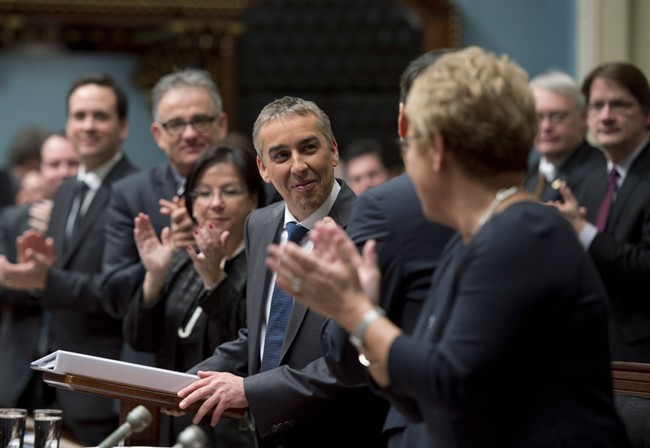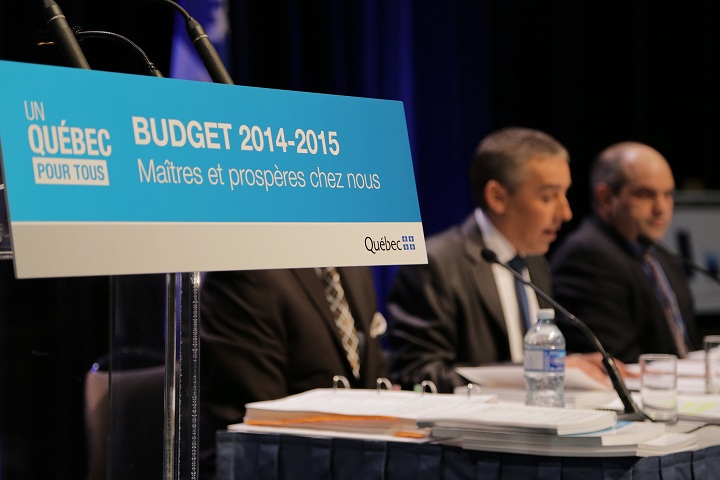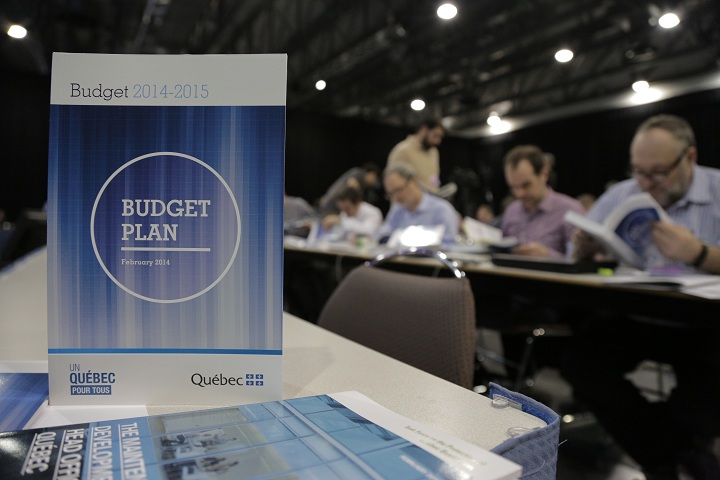QUEBEC – The Parti Quebecois government tabled what it calls a “responsible” budget Thursday aimed at erasing doubts over the party’s economic record and blunting opponent attacks ahead of an expected spring election.

The fiscal blueprint projects a $1.75-billion shortfall in 2014-15 on revenue of $71.6 billion.
Premier Pauline Marois’ government, which backed away from an earlier prediction to balance the books by this year, now promises to guide the struggling province out of the red by 2015-16.
READ MORE: Quebec Budget 2014: Special coverage and live blog
Under Finance Minister Nicolas Marceau’s plan, the PQ seeks to create jobs, avoid tax hikes, further exploit Quebec’s natural resources and rein in government spending, such as pushing for “fair” agreements with physicians and public-sector workers during upcoming contract negotiations.
Marceau’s budget also calls for rate hikes to Quebec’s signature, $7-a-day public childcare program.
Starting in September, parents will pay $8 per day for the service, a rate that will rise to $9 per day in 2015 and be indexed in subsequent years. The government aims to increase the share of parental contributions to a program first introduced by Marois herself in 1997.
READ MORE: Five highlights from Quebec’s ‘beige’ budget
Marceau presented the economic road map at a critical time for the minority PQ, which is widely expected to call a snap election in the coming weeks as polls suggest Marois is within striking distance of a majority mandate.
Filled with figures touting its economic credentials, the PQ’s budget appears designed to limit the sting of its rivals, who have repeatedly criticized the party over its management of the economy.
Before tabling the budget Thursday, Marceau said the plan addresses Quebec’s needs regardless of whether an election is called for the spring.
“The idea of selling it in any context is not going to pose us any problems,” he said.
“It is responsible and it meets Quebecers’ wishes to have the government control spending and stimulate the economy without bringing in any tax hikes. We are doing what is necessary for Quebec.”

Get breaking National news
The budget sought to highlight the pro-independence party’s economic accomplishments since defeating Jean Charest’s Liberal government in September 2012.
The PQ says 47,800 jobs were created in 2013, the province’s best performance in three years. It also says the 2013 unemployment rate of 7.6 per cent was at its lowest since the 2008-09 recession and predicts it to drop to 7.4 per cent in 2014.
The document projects the government to set the growth of program spending at two per cent per year, a target it says would be far below the 4.4 per cent annual average increases of previous Liberal governments.
AT A GLANCE: Winners and losers of Quebec’s 2014 budget
On Wednesday, a report published by Quebec’s interim auditor general said the PQ’s goal of achieving a balanced budget by 2015-16 was “to say the least, ambitious,” particularly if it rules out tax hikes and caps government-spending increases at two per cent over the next two years.
Before the budget was tabled Thursday, Liberal Leader Philippe Couillard called the PQ announcement a campaign launch rather than a budget because it hides detailed government expenses.
“It’s just an electoral tool,” said the Opposition leader, who also accused the PQ of re-announcing policies already implemented in recent years by previous Liberal governments.
Asked why the budget lacked detailed expenditures, Marceau said he did not want his department to complete the calculations before the budget was adopted.
Both the Liberals and the third-place Coalition party said they couldn’t support the budget.
They also warned the PQ proposal to boost daycare fees would heap too much of a burden on middle-class families.
“It’s too quick, too sudden – it’s a big shock for taxpayers,” said Couillard, who added the Liberals believe indexation is a more-reasonable measure.
Francois Legault, leader of the right-of-centre Coalition party, estimated the budgetary measures would cost families about $500 more per year.
“We need to go in the opposite direction,” said Legault, a former PQ cabinet minister.
“There was a time that the Parti Quebecois was the family party – it’s not anymore.”
Other budget highlights:
– $270 million for 3,250 new social-housing units, including 500 for the homeless.
– Tuition fees and exemptions for students from outside Quebec will be reviewed.
– $4 million per year to support training for part-time volunteer firefighters in the wake of the Lac-Megantic and L’Isle-Verte disasters.
– The negotiation of a “fair” agreement for taxpayers with Quebec’s 430,000 public workers, whose payroll absorbed 59 per cent – or $37.3 billion – of government spending in 2013-14. The existing deal expires in March 2015.
– The negotiation of a new contract with physicians, taking into account remuneration gains and changes compared to the rest of Canada. The government says under the existing deal, which also expires in March 2015, physician salaries in Quebec have risen by 70 per cent over six years.
The measures targeting the physicians, the public-sector employees and the non-resident students could strike a chord with many right-leaning Quebecers who might be tempted to move away from the Coalition to park their vote with the PQ.
In its drive for a majority, the PQ will be targeting many ridings just outside Montreal that some Coalition members won in 2012 with slim majorities.
With Marois widely expected to call an election, the legislature may never get the chance to vote on the budget. MNAs began a two-week break Thursday from the national assembly.
READ MORE: The budget in its entirety
The PQ government holds just a slim majority of seats in the legislature, so it would need support from at least one opposition party for the budget to pass.
Marois made a series of campaign-style announcements in recent weeks in an effort to silence critics who accuse her party of having a poor economic record.
The PQ’s multimillion-dollar investments include cash for a new cement plant in the Gaspe region and an oil-exploration project on Quebec’s remote Anticosti Island.
In his budget speech, Marceau also called promoting energy independence a priority for the government.
“In the early 1960s, Jean Lesage and Rene Levesque inspired the Quiet Revolution with their message ‘Maitres chez nous’ (masters in our own house),” he said.
“Today, we are picking up the torch … Starting today, not only will we be masters in our own house, but we will also be prosperous in our own house.”
Marceau also took aim at Ottawa, saying last week’s federal budget heralded the return of a fiscal imbalance between Ottawa and the provinces.
“The Canadian government tabled a budget that attacks Quebec’s interests head on and flouts the very idea of federalism,” he said.
“Until Quebec takes charge of its future definitively, it is essential that the federal government give back to Quebec and the provinces the resources it took away from them through unilateral changes.”









Comments
Want to discuss? Please read our Commenting Policy first.